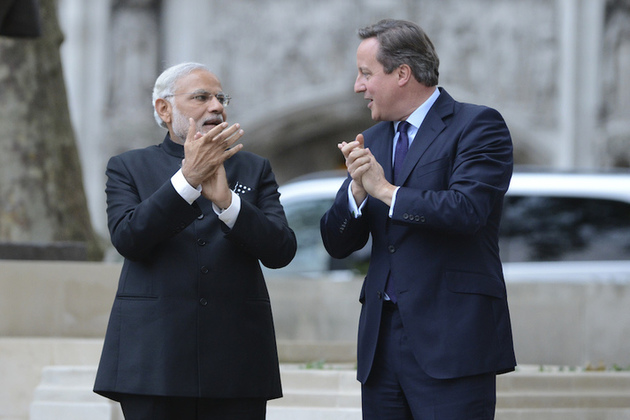Foreign Investments Amidst Nationwide Turbulence in India
Indian Prime Minister Narendra Modi recently concluded a three-day visit to the UK, the first visit by an Indian prime minister in over a decade. Over the course of the trip, during which $15 billion of trade and investment deals were revealed, Modi addressed the British parliament, met with chief executives and bankers in London, and spoke at a rally of 60,000 supporters in Wembley Stadium. Modi stated at the close of the trip, “The progress on the economic front was satisfying. India and UK are partners in development and our economic cooperation is all set to increase.”
While the trip was perceived as a success for having increased India’s attractiveness to international investors, hundreds in Britain expressed resentment towards the visit by staging protests outside 10, Downing Street, the British Prime Minister’s office. Protests revolved around claims of human rights abuses in India, growing religious intolerance, and the prime minister’s role in the deaths of 1,000 Muslims during the 2002 Gujarat riots.

Suresh Grover, the director of a UK group which campaigns against human rights violations, stated, “…what we want now is the acknowledgement of his acts of omission and commission in the riots. That’s what we are protesting about.”
The protests in Britain reflect the tumultuous conditions back in India, where government inaction toward religious intolerance is sparking nationwide concern. The government’s passive response to the murder of a Muslim laborer who was believed to have slaughtered a cow prompted over forty writers and artists to return their awards in a symbolic act of protest. The recent loss of Modi’s Bharatiya Janata Party in a crucial election in Bihar further indicates growing backlash towards escalating nationalism, intolerance, and restrictions on Muslims’ freedoms.
As discontent in India continues to grow due to the polarizing nationalistic actions of Modi and the BJP, it is uncertain how increasingly turbulent conditions in the nation will affect future investment.
British Prime Minister David Cameron, who followed requests of over 200 authors to address concerns of freedom of speech with Modi, stated, “I see India as I see Britain, a country that is a vibrant multi-racial, multi-faith, multi-ethnic democracy that has very strong public debate, freedom of speech, rule of law and those are things that Britain and India continue to learn from each other… Above all, I can see that Prime Minister Modi is deadly serious about his plans to transform India and Britain can play a big part in helping him to do that.”
